2023年冀教版中考英语一轮复习 第四课时 七年级下册(Unit 5~Unit 8)课件(58张PPT)
文档属性
| 名称 | 2023年冀教版中考英语一轮复习 第四课时 七年级下册(Unit 5~Unit 8)课件(58张PPT) | 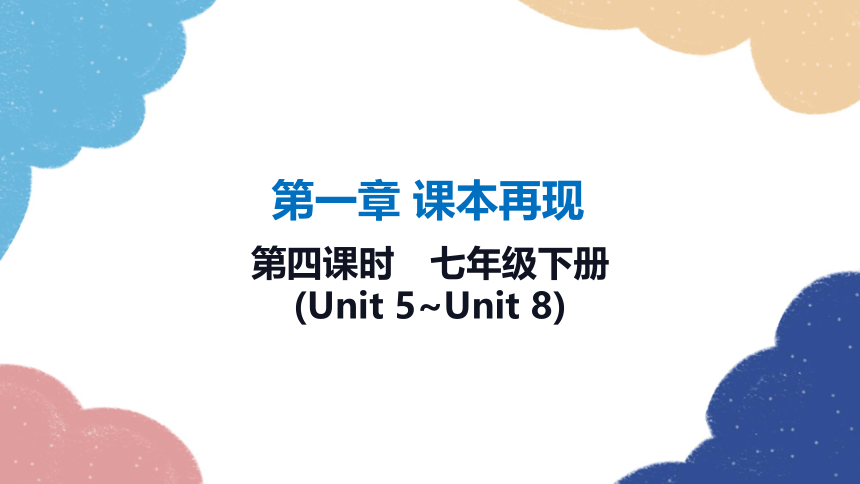 | |
| 格式 | pptx | ||
| 文件大小 | 561.7KB | ||
| 资源类型 | 教案 | ||
| 版本资源 | 冀教版 | ||
| 科目 | 英语 | ||
| 更新时间 | 2023-05-23 16:31:08 | ||
图片预览


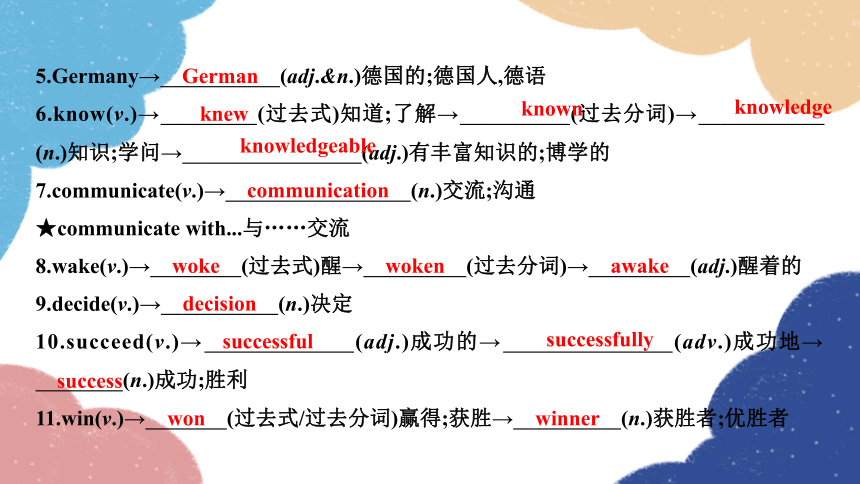
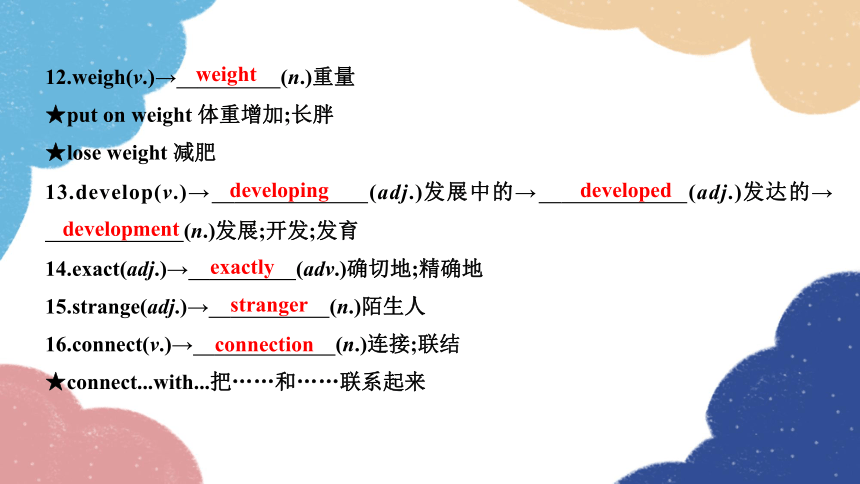
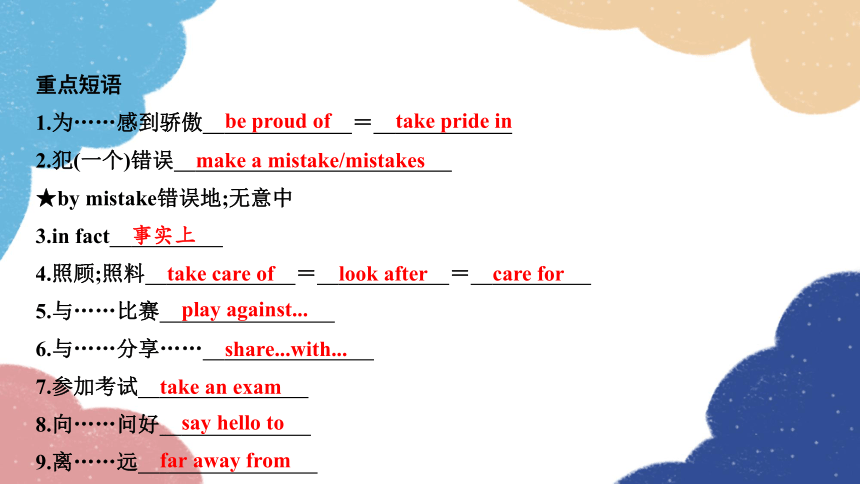
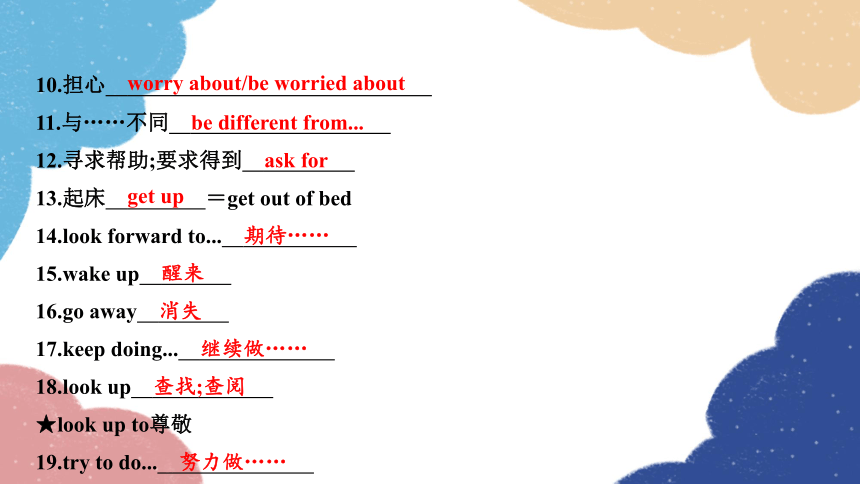
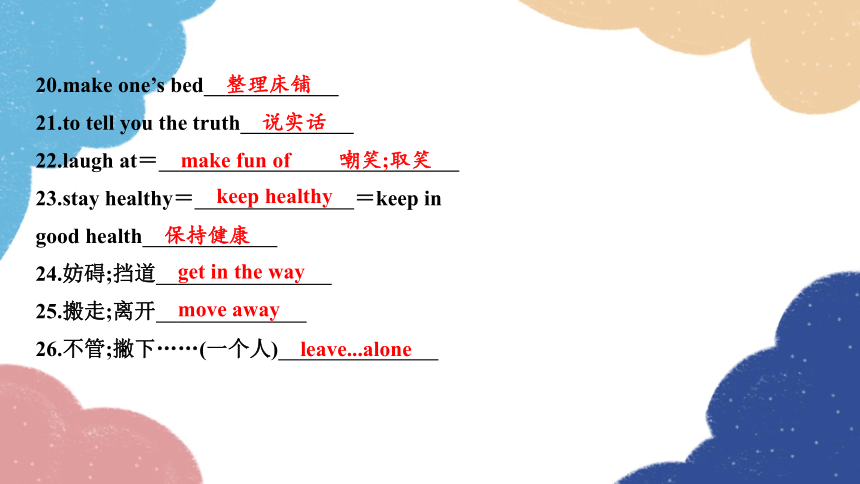
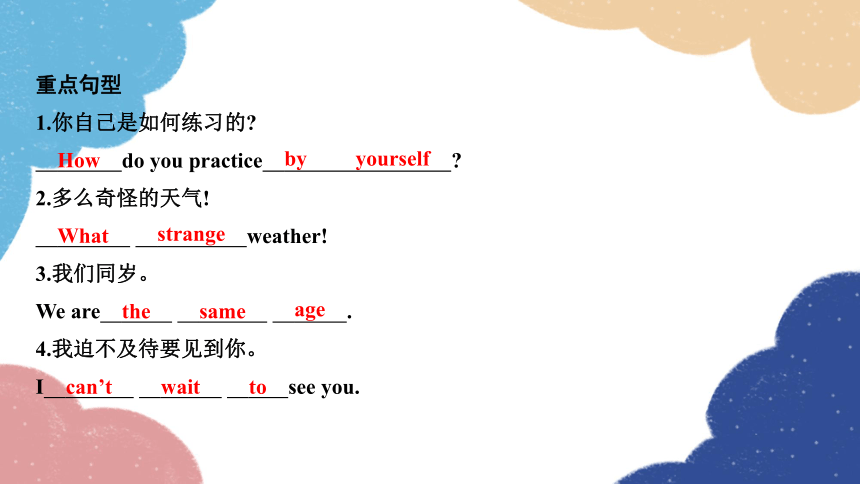
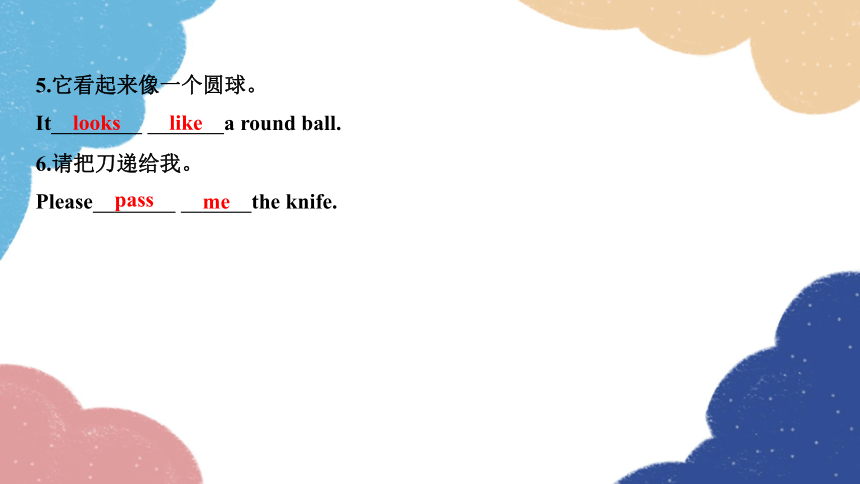
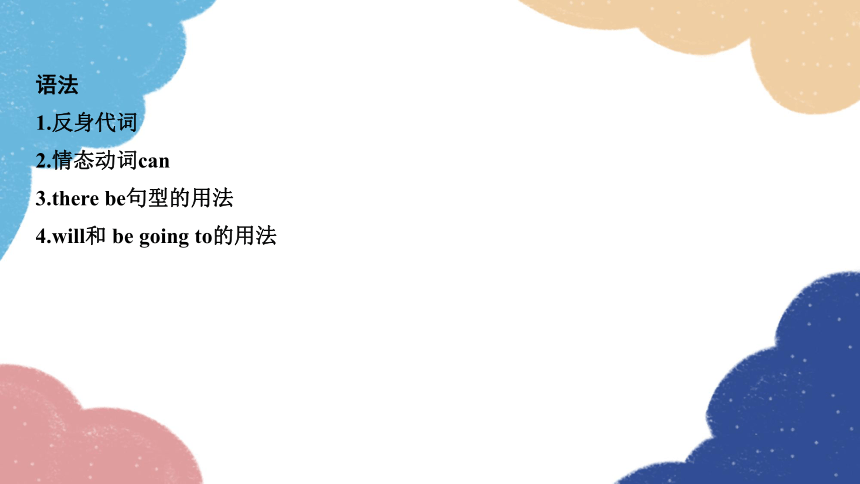
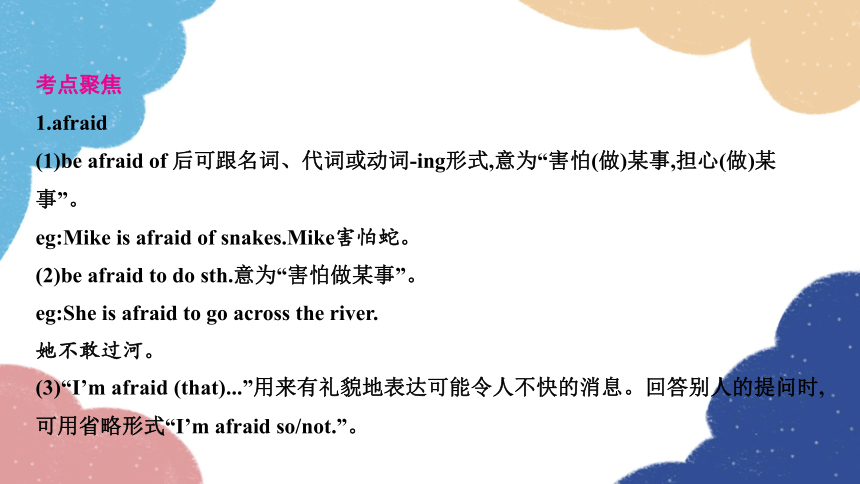
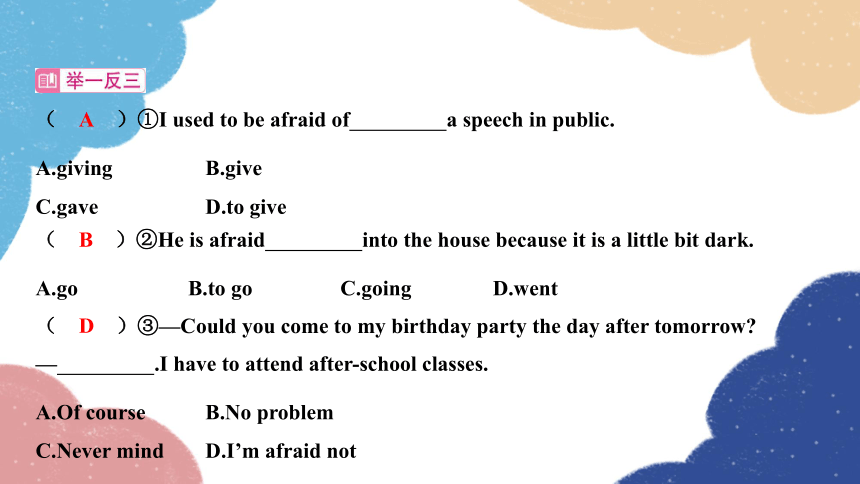
文档简介
(共58张PPT)
第四课时 七年级下册(Unit 5~Unit 8)
第一章 课本再现
知识归纳
词汇拓展
1.pride(n.)→ proud (adj.)自豪的;引以为荣的
★take pride in以……为骄傲
2.health(n.)→ healthy (adj.)健康的;强健的→ unhealthy (反义词)不健康的→ healthily (adv.)健康地→ unhealthily (反义词)不健康地
3.awful(adj.)→ awfully (adv.)可怕地;十分;非常
4.care(n.&v.)→ careful (adj.)小心的;仔细的→ carefully (adv.)仔细地;小心翼翼地
proud
healthy
unhealthy
healthily
unhealthily
awfully
careful
carefully
5.Germany→ German (adj.&n.)德国的;德国人,德语
6.know(v.)→ knew (过去式)知道;了解→ known (过去分词)→ knowledge (n.)知识;学问→ knowledgeable (adj.)有丰富知识的;博学的
German
knew
known
knowledge
knowledgeable
7.communicate(v.)→ communication (n.)交流;沟通
★communicate with...与……交流
8.wake(v.)→ woke (过去式)醒→ woken (过去分词)→ awake (adj.)醒着的
9.decide(v.)→ decision (n.)决定
10.succeed(v.)→ successful (adj.)成功的→ successfully (adv.)成功地→ success (n.)成功;胜利
11.win(v.)→ won (过去式/过去分词)赢得;获胜→ winner (n.)获胜者;优胜者
communication
woke
woken
awake
decision
successful
successfully
success
won
winner
12.weigh(v.)→ weight (n.)重量
★put on weight 体重增加;长胖
★lose weight 减肥
weight
13.develop(v.)→ developing (adj.)发展中的→ developed (adj.)发达的→ development (n.)发展;开发;发育
14.exact(adj.)→ exactly (adv.)确切地;精确地
15.strange(adj.)→ stranger (n.)陌生人
16.connect(v.)→ connection (n.)连接;联结
★connect...with...把……和……联系起来
developing
developed
development
exactly
stranger
connection
重点短语
1.为……感到骄傲 be proud of = take pride in
2.犯(一个)错误 make a mistake/mistakes
★by mistake错误地;无意中
3.in fact 事实上
4.照顾;照料 take care of = look after = care for
5.与……比赛 play against...
6.与……分享…… share...with...
7.参加考试 take an exam
8.向……问好 say hello to
9.离……远 far away from
be proud of
take pride in
make a mistake/mistakes
事实上
take care of
look after
care for
play against...
share...with...
take an exam
say hello to
far away from
10.担心 worry about/be worried about
11.与……不同 be different from...
12.寻求帮助;要求得到 ask for
13.起床 get up =get out of bed
14.look forward to... 期待……
15.wake up 醒来
16.go away 消失
17.keep doing... 继续做……
18.look up 查找;查阅
★look up to尊敬
19.try to do... 努力做……
worry about/be worried about
be different from...
ask for
get up
期待……
醒来
消失
继续做……
查找;查阅
努力做……
20.make one’s bed 整理床铺
21.to tell you the truth 说实话
22.laugh at= make fun of 嘲笑;取笑
23.stay healthy= keep healthy =keep in
good health 保持健康
24.妨碍;挡道 get in the way
25.搬走;离开 move away
26.不管;撇下……(一个人) leave...alone
整理床铺
说实话
make fun of 嘲笑;取笑
keep healthy
保持健康
get in the way
move away
leave...alone
重点句型
1.你自己是如何练习的
How do you practice by yourself
2.多么奇怪的天气!
What strange weather!
3.我们同岁。
We are the same age .
4.我迫不及待要见到你。
I can’t wait to see you.
How
by yourself
What
strange
the
same
age
can’t
wait
to
6.请把刀递给我。
Please pass me the knife.
pass
me
5.它看起来像一个圆球。
It looks like a round ball.
looks
like
语法
1.反身代词
2.情态动词can
3.there be句型的用法
4.will和 be going to的用法
考点聚焦
1.afraid
(1)be afraid of 后可跟名词、代词或动词-ing形式,意为“害怕(做)某事,担心(做)某事”。
eg:Mike is afraid of snakes.Mike害怕蛇。
(2)be afraid to do sth.意为“害怕做某事”。
eg:She is afraid to go across the river.
她不敢过河。
(3)“I’m afraid (that)...”用来有礼貌地表达可能令人不快的消息。回答别人的提问时,可用省略形式“I’m afraid so/not.”。
( A )①I used to be afraid of a speech in public.
A.giving B.give
C.gave D.to give
( B )②He is afraid into the house because it is a little bit dark.
A.go B.to go C.going D.went
( D )③—Could you come to my birthday party the day after tomorrow
— .I have to attend after-school classes.
A.Of course B.No problem
C.Never mind D.I’m afraid not
A
B
D
2.make
make作及物动词的用法如下:
(1)意为“做;制造;制订”,常见结构make sb.sth.=make sth.for sb.意为“给某人做某物”。
eg:They are making machines.
他们正在制造机器。
(2)意为“获得;赚得”,常见短语:make money意为“赚钱”;make a living意为“谋生”。
eg:He makes 4 000 yuan a month.
他每月挣4 000元。
(3)意为“使……成为……;使……做……”,常见结构:make sb./sth.+adj.意为“使某人/某物处于某种状态”;make sb./sth.do sth.意为“使某人/某物做某事”。
eg:We should plant more trees,and make our earth more beautiful.
我们应当种更多的树,使我们的地球更美丽。
( D )①The young man broke his boss’s new vase.It made his boss high and very angry.
A.to jump B.jumped
C.jumps D.jump
( D )②—How do you feel when watching the national flag going up
—It makes me very proud.
A.felt B.to feel
C.feeling D.feel
D
D
3.look up
look up为“动词+副词”型短语,意为“查找;查阅”,其后跟名词或代词作宾语。但代词作宾语时须放在look与up中间,名词既可以放在中间也可以放在后面。
eg:If you don’t know the word,look it up in the dictionary.如果你不认识这个单词,在词典中查一下。
与look 相关的常用短语:
(1)look after 照看;照料
eg:He is old enough to look after himself.
他足够大,可以照顾自己了。
(2)look for 寻找
eg:I looked for you just now,but I didn’t find you.我刚刚在找你,但没找到。
(3)look around 环顾;四下察看
eg:He looked around,but he saw nobody.
他环顾四周,但没发现任何人。
(4)look back on 回想;回顾
eg:They often look back on the days they spent together.
他们时常回想起一起度过的时光。
(5)look down on看不起
eg:Don’t look down on others.
不要看不起别人。
(6)look forward to 期待
eg:We are looking forward to seeing you
again.我们盼望再次见到你。
(7)look into 朝……里面看
eg:He looked into the box,but he saw nothing.他往盒子里看了看,但没有看到任何东西。
(8)look on sb.as...把某人看作……
eg:We look on him as our friend.
我们把他看作我们的朋友。
(9)look out 当心
eg:Look out!Don’t hit the tree.
小心!不要撞到树。
(10)look over 查看;检查
eg:The doctor is looking him over.
医生正在给他检查。
(11)look through 浏览;快速查看
eg:She looked through her notes before the exam.她考试前浏览了一下笔记。
( A )①There is no need to every new word in the dictionary when you are reading.
A.look up B.look at
C.look after D.look through
( D )②Almost every university now has a website which allows us to the information about it.
A.look at B.look after
C.look around D.look through
A
D
4.spend
spend为动词的用法如下:
(1)意为“花(钱)”。
eg:She spent 100 yuan on a new dress.
她花100元买了一条新连衣裙。
(2)意为“花费时间;度过”。
eg:Can you spend the holiday with me
你可以和我一起度假吗
spend,take,pay与cost
单词 用法
spend 意为“花费(钱/时间)”,人作主语,常用句型“sb.spends...on...”或“sb.spends...(in) doing...”。
take 意为“花费”,常用句型“It takes sb.some time to do sth.”,意为“做某事花费某人……时间”,其中it是形式主语,真正的主语为动词不定式。
pay 意为“支付”,人作主语,常用结构“sb.pays money for sth.”。
cost 意为“花费”,物作主语,常用结构“sth.costs sb.money”。
eg:I often spend an hour (in) doing my
homework.
我经常要花一个小时做作业。
It takes her half an hour to walk to school.
步行上学要花费她半个小时。
My father paid 200 yuan for the shirt.
我父亲花了200元买了那件衬衫。
The book cost my brother 15 yuan.
我弟弟花了15元买了那本书。
①去年我和妈妈在中国度过了暑假。
I spent the summer holiday with my mother in China last year.
( B )②Jim,you’d better not too much time on your mobile phone.
A.cost B.spend
C.take D.pay
spent
with
B
5.used
(1)used to do sth.意为“过去常常做某事”,只用于过去时态。
eg:I used to get up early in the morning when I was a high school student.
当我是一名中学生时,我早上常常起得很早。
(2)be/get used to doing sth.意为“习惯于做某事”,可用于现在、过去、将来等时态中。
eg:He is used to looking after himself now.
他现在习惯于照顾自己。
(3)be used to do sth.意为“被用于做某事”,是被动语态,动词不定式表示目的,可用于各种时态。
eg:Bamboo is used to make a lot of things.
竹子被用来制作许多东西。
( B )①The blender for making a
banana milk shake just now.
A.will be used B.was used
C.is used
B
( B )②I used to at half past six,but now I am getting used to at seven.
A.getting up;get up
B.get up;getting up
C.got up;getting up
D.got up;get up
B
6.decide
(1)decide的名词形式是decision,意为“决心;决定”,常用短语:make a decision to do sth.=make up one’s mind to do sth.(下决心做某事)。
(2)decide用作动词,意为“决定;作出判断”。其常见的用法有:
( D )①My friend and I decide tennis after finishing our homework thisSunday.
A.play B.plays
C.playing D.to play
( C )②It is raining heavily outside,so I decide on a book at home.
A.read B.to read
C.reading D.reads
D
C
7.—Hello.Can I speak to Jenny,please
你好。请问我能和Jenny通话吗
—Yes.This is Jenny speaking.
可以。我就是Jenny。
(1)“Can I speak to... ”是找某人接电话的礼貌用语。
(2)“This is...speaking.”意为“我就是某人”。若要找的人不在,应说“Sorry,sb.is not in.”。
eg:Can I speak to Mr.Wang,please
我能和王先生通话吗
( D )①—Hello.May I speak to Sandy
— .
A.Yes,I am Sandy
B.I will call back again
C.Yes,I cannot hear you
D.This is Sandy speaking
D
( C )②—May I speak to Tom
— .I am afraid you have a wrong number.
A.Speaking,please B.Hold on,please
C.Sorry D.This is Tom
C
8.watch
(1)watch作动词,意为“看”,多指看电视、比赛等。
eg:My father watches TV every evening.
我父亲每天晚上都看电视。
(2)watch作名词,意为“手表”,其复数形式为watches。
(3)常见结构:
①watch sb.do sth.意为“看到某人做某事”,多用于经常发生的事情或动作。
eg:I often watch the boys play basketball on weekends.
周末我经常看到那些男孩们打篮球。
②watch sb.doing sth.意为“看到某人正在做某事”,强调动作正在进行。
eg:I love to watch the monkeys climbing up the trees.我喜欢看猴子爬树。
(4)常见固定短语:
watch TV看电视
watch a movie 看电影
watch a match 看比赛
watch,read,look与see
watch 侧重“观看”,指目不转睛地看。
read 指看有文字内容的东西,意为“阅读”。
look 强调看的动作,后跟宾语时要加介词at。
see 强调看的结果。
The students are looking at a picture.
学生们正在看一幅画。
I see a bird in the tree.
我看见树上有一只鸟。
eg:Did you watch the football match yesterday
你昨天看那场足球赛了吗
She is reading a book.
她正在看书。
①我想看一场足球赛。
I want to watch a football match.
( A )② !The women are dancing over there.
A.Look B.See
C.Watch D.Look at
want
to
watch
A
五年中考
一、单项选择
( A )1.(2022·省卷)The rang and Pat answered it.It was his son calling from New York.
A.telephone B.doorbell
C.clock D.bike
( D )2.(2022·省卷)—How’s the new restaurant
—It’s .We waited a long time for the food to arrive.
A.wonderful B.exciting
C.difficult D.awful
A
D
( A )3.(2022·甘南州)—Is that Jack over there
—It be him.He is having a piano lesson now.
A.can’t B.might not C.must
( B )4.(2021·甘南州)Don’t every new word in the dictionary while reading an English novel.
A.look at B.look up C.look for
A
B
( B )5.(2021·甘南州)—Hello!Can I speak to George
—He’s out at the moment.
A.Who are you
B.Can I take a message
C.How are you
( D )6.(2020·省卷)You haven’t eaten all day.You be very hungry.
A.couldn’t be B.can’t
C.might D.must
B
D
( A )7.(2020·天水)He most of his time English.
A.spends;studying B.costs;studied
C.takes;to study D.pays;studies
( A )8.(2020·兰州)It is not always necessary to new words in the dictionary while reading.
A.look up B.look at
C.look for D.look around
A
A
( A )9.(2019·省卷)—Hello,may I speak toDaisy
—Hi!
A.This is Daisy speaking.
B.She is Daisy.
C.What is Daisy
D.That is Daisy.
( A )10.(2019·省卷)—Whose cap is this Is it Cindy’s
—It be hers.Don’t youremember she even didn’t come to the party
A.can’t B.might
C.may not D.must
A
A
( B )11.(2019·兰州)—Can I help you,Sir
—Yes,please.I am a blueT-shirt.
A.looking up B.looking for
C.looking after D.looking through
( D )12.(2019·兰州)In the near future,there self-driving cars in our city.
A.is B.was
C.are D.will be
B
D
( B )13.(2018·省卷)Our city is cleaner than it be.
A.is used to B.used to
C.uses to D.is used
( D )14.(2018·省卷)—Can we play soccer here
—No,you play it near the road.That’s too dangerous!
A.can B.may
C.won’t D.mustn’t
B
D
( C )15.—Listen!Is that Linda playing the piano in the room
—No.It be Linda.She has gone to London.
A.may not B.needn’t
C.can’t D.mustn’t
C
二、用所给词的适当形式填空
1.(2022·甘南州改编)Parents should knowthat comparing their kids with otherchildren is not good for the kid’s development (develop).
2.(2021·省卷)We Chinese are proud (pride) of the great changes in our country.
3.(2021·省卷)We couldn’t do all the work by ourselves (us).
4.(2019·省卷)My 18-year-old elder brother can take good care of himself (he).
5.(2018·省卷)You shouldn’t be too hard on yourself (you).
6.(2018·兰州)Though the little boy isyoung,he can dress himself (he) without anyone’s help.
development
proud
ourselves
himself
yourself
himself
三、根据汉语提示完成句子
1.(2022·省卷)他过去特别安静。
He used to be really quiet.
2.(2022·甘南州)事实上,他是一个好搭档。
In fact ,he is a good partner.
used to
In fact
四、按要求完成句子
1.(2022·白银)Tom goes to schoolwith his best friendevery day.(对画线部分提问)
Who does Tom go to school with every day
2.(2022·天水)The dragon boat is verypretty.(改为感叹句)
How pretty the dragon boat is!
Who
does
How
pretty
备考演练
一、单项选择
( A )1.(2022·湖南益阳)—What are you going to do this afternoon
—My parents are very busy,so I have to my little brother.
A.look after B.look like
C.look up
( C )2.(2022·四川凉山州)Linda works very ,so she seldom makes mistakes.
A.quickly B.easily C.carefully
A
C
( B )3.(2022·湖北鄂州)—I think it’s a good habit to new words in adictionary.
—Yes,that’s helpful to us.
A.look after B.look up
C.look at D.look for
( A )4.(2022·辽宁大连)Once a term,there a parents’ meeting in our school.
A.is B.are
C.was D.were
B
A
( B )5.(2022·广西百色)— you tell us a story in English
—I think I can do it.Let me try.
A.Need B.Can
C.Should D.Must
( C )6.(2022·黑龙江牡丹江)—
—Wait a minute.I’ll go and call him in.
A.Are you Mr.White
B.Who’s speaking
C.May I speak to Mr.White,please
B
C
( C )7.(2022·安徽)—I do morning exercises every day.It works my whole body.
—It’s a good habit.It helps you keep in good .
A.time B.touch
C.health D.silence
( D )8.(2022·江苏连云港)We are that the Great Wall is one of the wonders of the world.
A.friendly B.brave
C.nervous D.proud
C
D
( C )9.(2022·海南)—It’s said that the Shenzhou-14 astronauts will say hello to us on Mid-Autumn Day.
—Wonderful!I’m it.
A.getting along with
B.staying away from
C.looking forward to
C
二、用所给词的适当形式填空
1.(2022·四川广安改编)Our school team won (win) the football match last week.
2.(2022·江苏泰州)With the development (develop) of the society,more and more
people devote their energy to charity.
3.(2022·江苏扬州)Let me repeat exactly (exact) what he just said.
4.(2022·广西贺州改编)You’d better spend more time doing (do) sports after school to keep healthy.
5.(2022·江苏扬州)A healthy (health) competitive spirit can push people to try to be better.
won
development
exactly
doing
healthy
三、根据汉语意思完成句子
1.(2022·湖北黄冈改编)人们应该习惯于乘坐公共交通工具出行。
People should get used to travelling by public transportation.
2.(2022·江苏无锡改编)人无完人,自我解嘲意味着接纳自己。
No one is perfect. Laughing at
yourself means accepting who you are.
3.(2022·四川达州)我们可以把需要学习的内容与感兴趣的东西联系起来。
We can connect what we need to learn with what we are interested in.
4.(2022·湖北十堰)Mary很粗心,经常错误地拿走别人的家庭作业。
Mary is so careless that she often takes others’ homework by mistake .
used
to
Laughing
at
connect
with
by
mistake
5.(2022·辽宁营口)无论你何时遇到生词,都可以在字典里查到。
Whenever you meet new words,you can
look them up in a dictionary.
look
up
第四课时 七年级下册(Unit 5~Unit 8)
第一章 课本再现
知识归纳
词汇拓展
1.pride(n.)→ proud (adj.)自豪的;引以为荣的
★take pride in以……为骄傲
2.health(n.)→ healthy (adj.)健康的;强健的→ unhealthy (反义词)不健康的→ healthily (adv.)健康地→ unhealthily (反义词)不健康地
3.awful(adj.)→ awfully (adv.)可怕地;十分;非常
4.care(n.&v.)→ careful (adj.)小心的;仔细的→ carefully (adv.)仔细地;小心翼翼地
proud
healthy
unhealthy
healthily
unhealthily
awfully
careful
carefully
5.Germany→ German (adj.&n.)德国的;德国人,德语
6.know(v.)→ knew (过去式)知道;了解→ known (过去分词)→ knowledge (n.)知识;学问→ knowledgeable (adj.)有丰富知识的;博学的
German
knew
known
knowledge
knowledgeable
7.communicate(v.)→ communication (n.)交流;沟通
★communicate with...与……交流
8.wake(v.)→ woke (过去式)醒→ woken (过去分词)→ awake (adj.)醒着的
9.decide(v.)→ decision (n.)决定
10.succeed(v.)→ successful (adj.)成功的→ successfully (adv.)成功地→ success (n.)成功;胜利
11.win(v.)→ won (过去式/过去分词)赢得;获胜→ winner (n.)获胜者;优胜者
communication
woke
woken
awake
decision
successful
successfully
success
won
winner
12.weigh(v.)→ weight (n.)重量
★put on weight 体重增加;长胖
★lose weight 减肥
weight
13.develop(v.)→ developing (adj.)发展中的→ developed (adj.)发达的→ development (n.)发展;开发;发育
14.exact(adj.)→ exactly (adv.)确切地;精确地
15.strange(adj.)→ stranger (n.)陌生人
16.connect(v.)→ connection (n.)连接;联结
★connect...with...把……和……联系起来
developing
developed
development
exactly
stranger
connection
重点短语
1.为……感到骄傲 be proud of = take pride in
2.犯(一个)错误 make a mistake/mistakes
★by mistake错误地;无意中
3.in fact 事实上
4.照顾;照料 take care of = look after = care for
5.与……比赛 play against...
6.与……分享…… share...with...
7.参加考试 take an exam
8.向……问好 say hello to
9.离……远 far away from
be proud of
take pride in
make a mistake/mistakes
事实上
take care of
look after
care for
play against...
share...with...
take an exam
say hello to
far away from
10.担心 worry about/be worried about
11.与……不同 be different from...
12.寻求帮助;要求得到 ask for
13.起床 get up =get out of bed
14.look forward to... 期待……
15.wake up 醒来
16.go away 消失
17.keep doing... 继续做……
18.look up 查找;查阅
★look up to尊敬
19.try to do... 努力做……
worry about/be worried about
be different from...
ask for
get up
期待……
醒来
消失
继续做……
查找;查阅
努力做……
20.make one’s bed 整理床铺
21.to tell you the truth 说实话
22.laugh at= make fun of 嘲笑;取笑
23.stay healthy= keep healthy =keep in
good health 保持健康
24.妨碍;挡道 get in the way
25.搬走;离开 move away
26.不管;撇下……(一个人) leave...alone
整理床铺
说实话
make fun of 嘲笑;取笑
keep healthy
保持健康
get in the way
move away
leave...alone
重点句型
1.你自己是如何练习的
How do you practice by yourself
2.多么奇怪的天气!
What strange weather!
3.我们同岁。
We are the same age .
4.我迫不及待要见到你。
I can’t wait to see you.
How
by yourself
What
strange
the
same
age
can’t
wait
to
6.请把刀递给我。
Please pass me the knife.
pass
me
5.它看起来像一个圆球。
It looks like a round ball.
looks
like
语法
1.反身代词
2.情态动词can
3.there be句型的用法
4.will和 be going to的用法
考点聚焦
1.afraid
(1)be afraid of 后可跟名词、代词或动词-ing形式,意为“害怕(做)某事,担心(做)某事”。
eg:Mike is afraid of snakes.Mike害怕蛇。
(2)be afraid to do sth.意为“害怕做某事”。
eg:She is afraid to go across the river.
她不敢过河。
(3)“I’m afraid (that)...”用来有礼貌地表达可能令人不快的消息。回答别人的提问时,可用省略形式“I’m afraid so/not.”。
( A )①I used to be afraid of a speech in public.
A.giving B.give
C.gave D.to give
( B )②He is afraid into the house because it is a little bit dark.
A.go B.to go C.going D.went
( D )③—Could you come to my birthday party the day after tomorrow
— .I have to attend after-school classes.
A.Of course B.No problem
C.Never mind D.I’m afraid not
A
B
D
2.make
make作及物动词的用法如下:
(1)意为“做;制造;制订”,常见结构make sb.sth.=make sth.for sb.意为“给某人做某物”。
eg:They are making machines.
他们正在制造机器。
(2)意为“获得;赚得”,常见短语:make money意为“赚钱”;make a living意为“谋生”。
eg:He makes 4 000 yuan a month.
他每月挣4 000元。
(3)意为“使……成为……;使……做……”,常见结构:make sb./sth.+adj.意为“使某人/某物处于某种状态”;make sb./sth.do sth.意为“使某人/某物做某事”。
eg:We should plant more trees,and make our earth more beautiful.
我们应当种更多的树,使我们的地球更美丽。
( D )①The young man broke his boss’s new vase.It made his boss high and very angry.
A.to jump B.jumped
C.jumps D.jump
( D )②—How do you feel when watching the national flag going up
—It makes me very proud.
A.felt B.to feel
C.feeling D.feel
D
D
3.look up
look up为“动词+副词”型短语,意为“查找;查阅”,其后跟名词或代词作宾语。但代词作宾语时须放在look与up中间,名词既可以放在中间也可以放在后面。
eg:If you don’t know the word,look it up in the dictionary.如果你不认识这个单词,在词典中查一下。
与look 相关的常用短语:
(1)look after 照看;照料
eg:He is old enough to look after himself.
他足够大,可以照顾自己了。
(2)look for 寻找
eg:I looked for you just now,but I didn’t find you.我刚刚在找你,但没找到。
(3)look around 环顾;四下察看
eg:He looked around,but he saw nobody.
他环顾四周,但没发现任何人。
(4)look back on 回想;回顾
eg:They often look back on the days they spent together.
他们时常回想起一起度过的时光。
(5)look down on看不起
eg:Don’t look down on others.
不要看不起别人。
(6)look forward to 期待
eg:We are looking forward to seeing you
again.我们盼望再次见到你。
(7)look into 朝……里面看
eg:He looked into the box,but he saw nothing.他往盒子里看了看,但没有看到任何东西。
(8)look on sb.as...把某人看作……
eg:We look on him as our friend.
我们把他看作我们的朋友。
(9)look out 当心
eg:Look out!Don’t hit the tree.
小心!不要撞到树。
(10)look over 查看;检查
eg:The doctor is looking him over.
医生正在给他检查。
(11)look through 浏览;快速查看
eg:She looked through her notes before the exam.她考试前浏览了一下笔记。
( A )①There is no need to every new word in the dictionary when you are reading.
A.look up B.look at
C.look after D.look through
( D )②Almost every university now has a website which allows us to the information about it.
A.look at B.look after
C.look around D.look through
A
D
4.spend
spend为动词的用法如下:
(1)意为“花(钱)”。
eg:She spent 100 yuan on a new dress.
她花100元买了一条新连衣裙。
(2)意为“花费时间;度过”。
eg:Can you spend the holiday with me
你可以和我一起度假吗
spend,take,pay与cost
单词 用法
spend 意为“花费(钱/时间)”,人作主语,常用句型“sb.spends...on...”或“sb.spends...(in) doing...”。
take 意为“花费”,常用句型“It takes sb.some time to do sth.”,意为“做某事花费某人……时间”,其中it是形式主语,真正的主语为动词不定式。
pay 意为“支付”,人作主语,常用结构“sb.pays money for sth.”。
cost 意为“花费”,物作主语,常用结构“sth.costs sb.money”。
eg:I often spend an hour (in) doing my
homework.
我经常要花一个小时做作业。
It takes her half an hour to walk to school.
步行上学要花费她半个小时。
My father paid 200 yuan for the shirt.
我父亲花了200元买了那件衬衫。
The book cost my brother 15 yuan.
我弟弟花了15元买了那本书。
①去年我和妈妈在中国度过了暑假。
I spent the summer holiday with my mother in China last year.
( B )②Jim,you’d better not too much time on your mobile phone.
A.cost B.spend
C.take D.pay
spent
with
B
5.used
(1)used to do sth.意为“过去常常做某事”,只用于过去时态。
eg:I used to get up early in the morning when I was a high school student.
当我是一名中学生时,我早上常常起得很早。
(2)be/get used to doing sth.意为“习惯于做某事”,可用于现在、过去、将来等时态中。
eg:He is used to looking after himself now.
他现在习惯于照顾自己。
(3)be used to do sth.意为“被用于做某事”,是被动语态,动词不定式表示目的,可用于各种时态。
eg:Bamboo is used to make a lot of things.
竹子被用来制作许多东西。
( B )①The blender for making a
banana milk shake just now.
A.will be used B.was used
C.is used
B
( B )②I used to at half past six,but now I am getting used to at seven.
A.getting up;get up
B.get up;getting up
C.got up;getting up
D.got up;get up
B
6.decide
(1)decide的名词形式是decision,意为“决心;决定”,常用短语:make a decision to do sth.=make up one’s mind to do sth.(下决心做某事)。
(2)decide用作动词,意为“决定;作出判断”。其常见的用法有:
( D )①My friend and I decide tennis after finishing our homework thisSunday.
A.play B.plays
C.playing D.to play
( C )②It is raining heavily outside,so I decide on a book at home.
A.read B.to read
C.reading D.reads
D
C
7.—Hello.Can I speak to Jenny,please
你好。请问我能和Jenny通话吗
—Yes.This is Jenny speaking.
可以。我就是Jenny。
(1)“Can I speak to... ”是找某人接电话的礼貌用语。
(2)“This is...speaking.”意为“我就是某人”。若要找的人不在,应说“Sorry,sb.is not in.”。
eg:Can I speak to Mr.Wang,please
我能和王先生通话吗
( D )①—Hello.May I speak to Sandy
— .
A.Yes,I am Sandy
B.I will call back again
C.Yes,I cannot hear you
D.This is Sandy speaking
D
( C )②—May I speak to Tom
— .I am afraid you have a wrong number.
A.Speaking,please B.Hold on,please
C.Sorry D.This is Tom
C
8.watch
(1)watch作动词,意为“看”,多指看电视、比赛等。
eg:My father watches TV every evening.
我父亲每天晚上都看电视。
(2)watch作名词,意为“手表”,其复数形式为watches。
(3)常见结构:
①watch sb.do sth.意为“看到某人做某事”,多用于经常发生的事情或动作。
eg:I often watch the boys play basketball on weekends.
周末我经常看到那些男孩们打篮球。
②watch sb.doing sth.意为“看到某人正在做某事”,强调动作正在进行。
eg:I love to watch the monkeys climbing up the trees.我喜欢看猴子爬树。
(4)常见固定短语:
watch TV看电视
watch a movie 看电影
watch a match 看比赛
watch,read,look与see
watch 侧重“观看”,指目不转睛地看。
read 指看有文字内容的东西,意为“阅读”。
look 强调看的动作,后跟宾语时要加介词at。
see 强调看的结果。
The students are looking at a picture.
学生们正在看一幅画。
I see a bird in the tree.
我看见树上有一只鸟。
eg:Did you watch the football match yesterday
你昨天看那场足球赛了吗
She is reading a book.
她正在看书。
①我想看一场足球赛。
I want to watch a football match.
( A )② !The women are dancing over there.
A.Look B.See
C.Watch D.Look at
want
to
watch
A
五年中考
一、单项选择
( A )1.(2022·省卷)The rang and Pat answered it.It was his son calling from New York.
A.telephone B.doorbell
C.clock D.bike
( D )2.(2022·省卷)—How’s the new restaurant
—It’s .We waited a long time for the food to arrive.
A.wonderful B.exciting
C.difficult D.awful
A
D
( A )3.(2022·甘南州)—Is that Jack over there
—It be him.He is having a piano lesson now.
A.can’t B.might not C.must
( B )4.(2021·甘南州)Don’t every new word in the dictionary while reading an English novel.
A.look at B.look up C.look for
A
B
( B )5.(2021·甘南州)—Hello!Can I speak to George
—He’s out at the moment.
A.Who are you
B.Can I take a message
C.How are you
( D )6.(2020·省卷)You haven’t eaten all day.You be very hungry.
A.couldn’t be B.can’t
C.might D.must
B
D
( A )7.(2020·天水)He most of his time English.
A.spends;studying B.costs;studied
C.takes;to study D.pays;studies
( A )8.(2020·兰州)It is not always necessary to new words in the dictionary while reading.
A.look up B.look at
C.look for D.look around
A
A
( A )9.(2019·省卷)—Hello,may I speak toDaisy
—Hi!
A.This is Daisy speaking.
B.She is Daisy.
C.What is Daisy
D.That is Daisy.
( A )10.(2019·省卷)—Whose cap is this Is it Cindy’s
—It be hers.Don’t youremember she even didn’t come to the party
A.can’t B.might
C.may not D.must
A
A
( B )11.(2019·兰州)—Can I help you,Sir
—Yes,please.I am a blueT-shirt.
A.looking up B.looking for
C.looking after D.looking through
( D )12.(2019·兰州)In the near future,there self-driving cars in our city.
A.is B.was
C.are D.will be
B
D
( B )13.(2018·省卷)Our city is cleaner than it be.
A.is used to B.used to
C.uses to D.is used
( D )14.(2018·省卷)—Can we play soccer here
—No,you play it near the road.That’s too dangerous!
A.can B.may
C.won’t D.mustn’t
B
D
( C )15.—Listen!Is that Linda playing the piano in the room
—No.It be Linda.She has gone to London.
A.may not B.needn’t
C.can’t D.mustn’t
C
二、用所给词的适当形式填空
1.(2022·甘南州改编)Parents should knowthat comparing their kids with otherchildren is not good for the kid’s development (develop).
2.(2021·省卷)We Chinese are proud (pride) of the great changes in our country.
3.(2021·省卷)We couldn’t do all the work by ourselves (us).
4.(2019·省卷)My 18-year-old elder brother can take good care of himself (he).
5.(2018·省卷)You shouldn’t be too hard on yourself (you).
6.(2018·兰州)Though the little boy isyoung,he can dress himself (he) without anyone’s help.
development
proud
ourselves
himself
yourself
himself
三、根据汉语提示完成句子
1.(2022·省卷)他过去特别安静。
He used to be really quiet.
2.(2022·甘南州)事实上,他是一个好搭档。
In fact ,he is a good partner.
used to
In fact
四、按要求完成句子
1.(2022·白银)Tom goes to schoolwith his best friendevery day.(对画线部分提问)
Who does Tom go to school with every day
2.(2022·天水)The dragon boat is verypretty.(改为感叹句)
How pretty the dragon boat is!
Who
does
How
pretty
备考演练
一、单项选择
( A )1.(2022·湖南益阳)—What are you going to do this afternoon
—My parents are very busy,so I have to my little brother.
A.look after B.look like
C.look up
( C )2.(2022·四川凉山州)Linda works very ,so she seldom makes mistakes.
A.quickly B.easily C.carefully
A
C
( B )3.(2022·湖北鄂州)—I think it’s a good habit to new words in adictionary.
—Yes,that’s helpful to us.
A.look after B.look up
C.look at D.look for
( A )4.(2022·辽宁大连)Once a term,there a parents’ meeting in our school.
A.is B.are
C.was D.were
B
A
( B )5.(2022·广西百色)— you tell us a story in English
—I think I can do it.Let me try.
A.Need B.Can
C.Should D.Must
( C )6.(2022·黑龙江牡丹江)—
—Wait a minute.I’ll go and call him in.
A.Are you Mr.White
B.Who’s speaking
C.May I speak to Mr.White,please
B
C
( C )7.(2022·安徽)—I do morning exercises every day.It works my whole body.
—It’s a good habit.It helps you keep in good .
A.time B.touch
C.health D.silence
( D )8.(2022·江苏连云港)We are that the Great Wall is one of the wonders of the world.
A.friendly B.brave
C.nervous D.proud
C
D
( C )9.(2022·海南)—It’s said that the Shenzhou-14 astronauts will say hello to us on Mid-Autumn Day.
—Wonderful!I’m it.
A.getting along with
B.staying away from
C.looking forward to
C
二、用所给词的适当形式填空
1.(2022·四川广安改编)Our school team won (win) the football match last week.
2.(2022·江苏泰州)With the development (develop) of the society,more and more
people devote their energy to charity.
3.(2022·江苏扬州)Let me repeat exactly (exact) what he just said.
4.(2022·广西贺州改编)You’d better spend more time doing (do) sports after school to keep healthy.
5.(2022·江苏扬州)A healthy (health) competitive spirit can push people to try to be better.
won
development
exactly
doing
healthy
三、根据汉语意思完成句子
1.(2022·湖北黄冈改编)人们应该习惯于乘坐公共交通工具出行。
People should get used to travelling by public transportation.
2.(2022·江苏无锡改编)人无完人,自我解嘲意味着接纳自己。
No one is perfect. Laughing at
yourself means accepting who you are.
3.(2022·四川达州)我们可以把需要学习的内容与感兴趣的东西联系起来。
We can connect what we need to learn with what we are interested in.
4.(2022·湖北十堰)Mary很粗心,经常错误地拿走别人的家庭作业。
Mary is so careless that she often takes others’ homework by mistake .
used
to
Laughing
at
connect
with
by
mistake
5.(2022·辽宁营口)无论你何时遇到生词,都可以在字典里查到。
Whenever you meet new words,you can
look them up in a dictionary.
look
up
